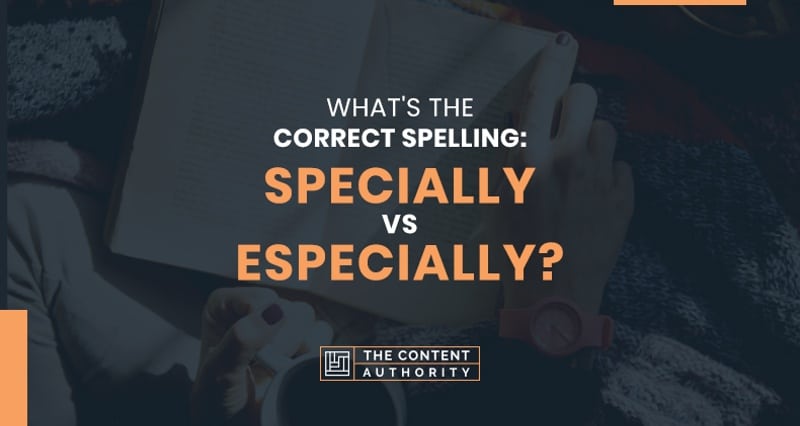The terms “specially” and “especially” are so similar that they sound almost the same when pronounced. Not to mention, their spellings are virtually identical too. But does that mean the two mean the same thing, as well?
The terms “specially” and “especially” mean “particularly”. Both are valid words. The latter is a bit more formal and used in business and academic texts. Also, “especially” implies “a sense of comparison”, which “specially” doesn’t. The right word to choose for a text comes down to specific rules.
“Specially” and “especially” come close to each other with their spellings, meanings, etc., and it’s pretty much okay to use them interchangeably too. But there are certain things you must be aware of and adhere to when using the two in your texts. Keep reading to learn what they are, or how “specially” and “especially” do not behave like clones, besides other things.

“Specially” – Definition
“Specially” means “particularly”, “in a special way”, or “for a particular or special purpose”. The word tries to highlight why something is “special” or “done uniquely”. The adverb is derived from the adjective, “special”, which means “particular”, “distinct”, “designed for a specific purpose”.
Besides “particularly”, other words that are related to or could be used as synonyms of “specially” include “notably”, “specifically”, and even “especially”. However, the word “especially” may not be the ideal substitute for “specially” in specific writing scenarios. (More on that later in the article)
“Especially” – Definition
“Especially” means “particularly”, too. However, the adverb denotes something “exceptional” or of higher quality, particularly compared to something else.
“Especially” has its roots in “especial”. “Especial” and “special” mean the same thing, but the former is not as common an adjective as “special”. Not to mention, “especially” has the exact synonyms or alternate words as “specially”.
Using “Especially” in Writings
As mentioned above, “especially” has a more “formal” vibe to it. It’s, therefore, used in sentences like the following:
- Mr. Rodgers showcases ruthless debating skills, especially when his opponents are deviating from facts.
Also, talking about “especially” implying “exceptional” attributes, here is a sentence illustrating that:
- The Bulls won the game, having played especially well during the fourth quarter than the Knicks.
“Especially” can be used “synonymously” with “specially”. However, to stress the “noteworthy” or “exceptional” quality of a particular thing or someone, “especially” is the better word. For instance, “specially” cannot be used in place of “especially” in the above sentence.
When “especially” denotes the subject, place the word right after it. For example:
- Teens, especially, are more vulnerable.
Though “especially” is an adverb, it can be positioned right before an adjective. For example:
- His laughter was especially annoying.
There are a few other things to consider when incorporating “especially” in your texts.
Comma Usage with “Especially”
“Especially” is more likely to have a comma on both sides or before it. Generally, when “especially” has a comma or punctuation before it, it typically brings two clauses together. For example:
- I love to read books, especially non-fiction and biographies.
“Specially” has no commas or any kind of punctuation mark around or near it because it doesn’t usually bring together two clauses.
This begs the question:

Can “especially” start a sentence?
It’s not acceptable in formal or academic writing to begin a sentence with “especially” because the texts that follow “especially” are not proper sentences or are fragments. They are dependent clauses, in other words. For example:
- I go to the gym throughout the week, especially if I have nothing much to do.
The part “if I have nothing much to do” is a dependent clause, or it cannot be a proper sentence by itself. “If I have nothing much to do”, on its own, doesn’t make any sense. It needs context or preface. However, if the “if” is taken out of the phrase, it can be a proper sentence. For example:
- I have nothing much to do.
Casual texts can start with “especially”, such as when writing an email to a friend. For example:
- Especially during the subprime mortgage crisis, when funds were scarce, some of the transactions were paid for in kind.
The casual usage of “especially” at a sentence’s beginning can be likened to how “because”, “since”, or other conjunctions kick-off a sentence. “Especially” is not a conjunction, by the way.
In verbal communications, “especially” at the start of a sentence is far more acceptable, even within business settings.
When used at the very beginning and correctly, “especially” is invariably modifying an adjective. For example:
- Especially big trucks should stay in the correct lane.
When in quotes, it’s both casually and formally okay to use “especially” at the beginning. For example:
- “Especially” may or may not be okay to use at the very start of a sentence.
Kindly note, for the context to be “casual”, the individual the text is directed at should be a friend, family member, etc. If it’s to a boss, client, or meant to feature in an official document, the environment is formal.
Using “Specially” in Texts
“Specially” is used in texts to signify a thing that’s made or done for a specific purpose. For example:
- They came down specially for us.
- The learning institution is specially for kids whose education has been affected by an illness.
Like “especially”, “specially” doesn’t make a comparison between two things. It only focuses on why something is special or something is done a specific way. For example:
- He treated his friends specially when they came to his town.
- The outfits were designed specially.
In the above sentences, “specially” cannot be replaced with “especially” because the sentences would seem incomplete. For example, the second sentence from above could use “especially” if it’s modified as:
- The outfits were designed especially for the wedding.
Some may argue that “specially” can also fit in the above sentence, which may be correct.
In the following sentences, however, “especially” cannot replace “specially”:
- Specially trained pets can be great companions for autistic kids.
- The costume consultants were specially trained for the job.
Also, “specially” could be preferred in specific writing contexts. If you’d like to stress the particular purpose of a given thing, “specially” is the word to use.
For example:
- The program had macros specially designed for word processors.
The line between “specially” and “especially” is extremely thin, and the interpretations, as a result, can vary significantly.
As mentioned at the beginning, “specially” can replace “especially” in casual settings. If “especially” seems like the correct term to use in a given sentence, “specially” can be used instead of the more suiting adverb if you’re writing to a friend, documenting thoughts in your diary, etc.
For example, the following sentences may not look appropriate as they should employ “especially” instead of “specially”. But they are acceptable if they’re not meant to be a part of an official document.
- It will be challenging to work tomorrow – specially if the weather forecasts are to be considered.
- I hate ice cream. Specially vanilla.
Regardless, “especially” is the more familiar word of the two. If you’re not sure whether the word to use is “especially” or “specially”, it’s most likely “especially”. And if you feel the need to use a comma with the adverb, it’s “especially” for sure.
Example Sentences with the Word “Specially”
The following are sentences using the term “specially”:
- We made this specially for you.
- The sapphire glass was specially made for the particular watch.
- The cake was made specially for her birthday.
- They came specially for her.
- The facility is located in a specially constructed five-stage building.
- These interfaces were specially developed to fulfill a specific purpose.
- Specially designed substances were used for the experiment.
In some of the sentences above, “especially” may seem perfectly fine instead of “specially”. If you think so, that’s fine.

Example Sentences with the Term “Especially”
Here is a relatively long list of sentences using “especially”, supporting the fact that “especially” is the more commonly used term:
- She was kind to her students, especially those who needed special assistance.
- Double ovens are great, especially if you’re planning to make multiple dishes at once.
- These modifications are especially vital to small firms.
- I love traveling, especially to places I’ve never been to before.
- Parents keep their kids at home, especially during the hot summer.
- The stress was showing on everybody’s faces, especially Peter.
- They were not able to visit all cities, especially not the ones by the coast.
- He didn’t know all of their names, especially not those who joined recently.
- That doesn’t sound especially pleasant.
- I don’t understand why the family was dragged into all of this – especially the kids!
- All that waiting felt like an eternity, especially as she was all by herself.
- I am surprised to see him speak the way he did, especially considering his background.
- She was not too keen on the idea, especially after discussing it with the board.
- Most do not confront her in a heated argument, especially if she’s visibly annoyed.
- She did especially well during the finals.
Conclusion
It’s clear there is little differentiating “specially” from “especially”. For most people, that minute difference may not matter, or they may end up using the terms interchangeably. However, the more learned and meticulous lot would focus on those minor differences and incorporate the two adverbs in their sentences, respecting those minor discrepancies.
If you’re someone who uses “specially” and “especially” with no second thoughts, reconsider your approach. Hopefully, this article would have given you the reasons and convinced you why the two terms are not perfect substitutes for each other.
Shawn Manaher is the founder and CEO of The Content Authority. He’s one part content manager, one part writing ninja organizer, and two parts leader of top content creators. You don’t even want to know what he calls pancakes.

